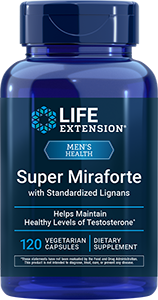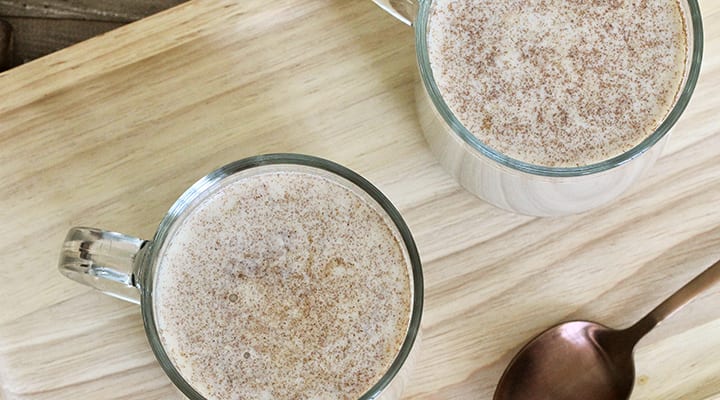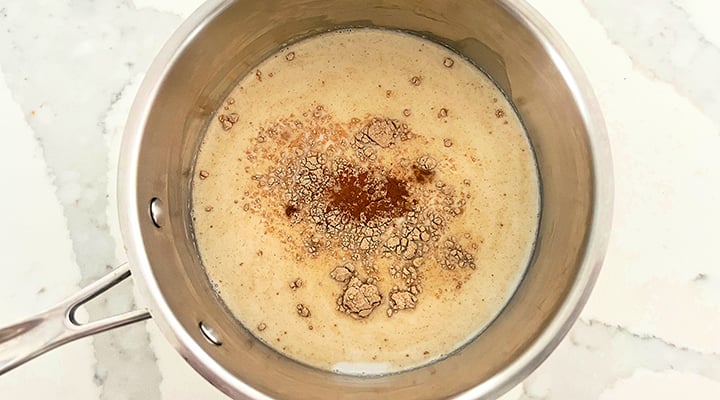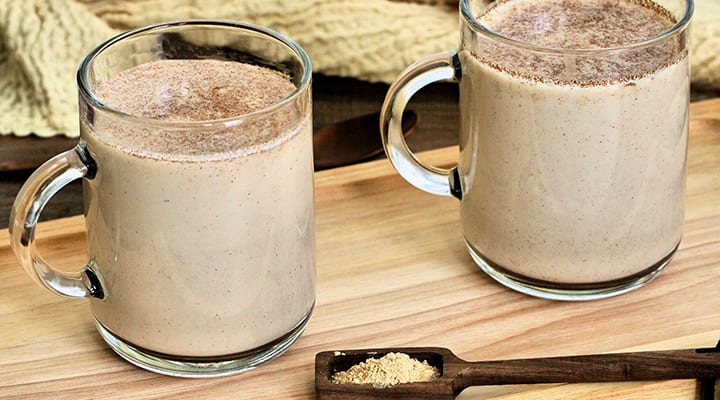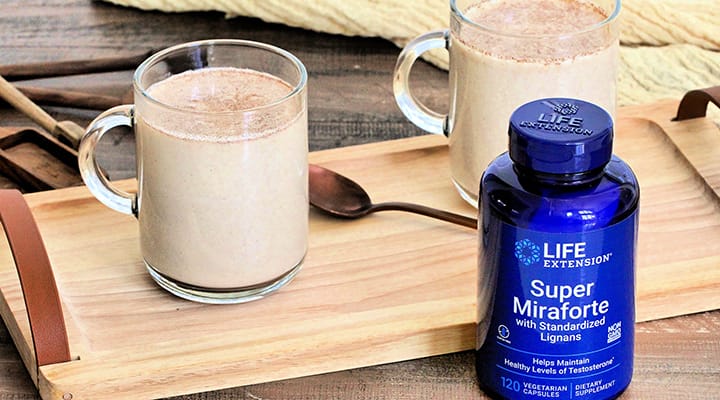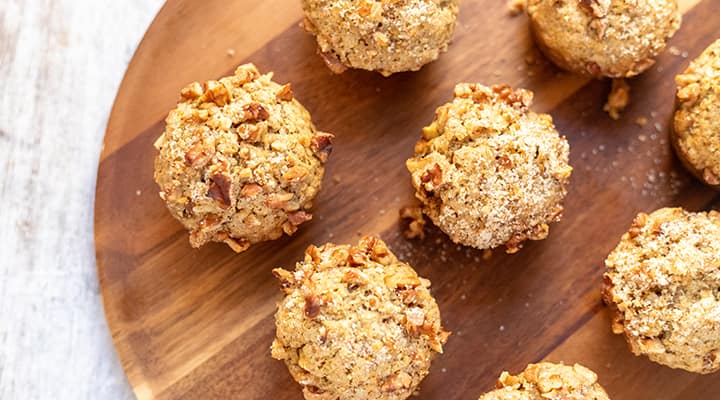
Maca Coffee: A Peruvian Recipe with Potential Health Benefits
Published: October 2023
If you're looking for a flavorful way to start your day or perk up your afternoons, try maca coffee—which, despite its name, contains neither coffee nor caffeine. Instead, this tasty, caffeine-free brew combines the earthy goodness of Peruvian maca root with the comforting elements of milk, cinnamon, and a touch of natural sweetness.
Scientifically known as Lepidium meyenii, maca is a cruciferous vegetable native to the high-altitude Andes Mountains in Peru. Lepidium meyenii is a small, radish-sized root with leaves. It is sometimes referred to as "Peruvian ginseng," because like traditional ginseng, it has been used to promote mood and sexual health. For that reason, some sources have called maca an adaptogen. Whatever you call it, maca is delicious when incorporated into a coffee-like recipe that can be whipped up in the comfort of your kitchen!
While it doesn't contain the jolt of caffeine you might experience from a traditional cup of coffee, maca's unique flavor and potential health benefits make it a great way to start the day!
What is maca coffee?
Maca coffee is a beverage made with maca powder blended with hot water or milk and other flavorings, such as cinnamon, cacao powder, and sweeteners. Maca coffee has a subtle natural sweetness with earthy and nutty undertones. And even though it's called "maca coffee," it does not contain coffee beans, making this comforting beverage recipe a unique twist on your morning cup of joe.
Maca coffee offers a unique and health-conscious alternative to traditional coffee, providing a rich and flavorful drink with added potential health benefits. Maca, a true superfood, supports sexual function for both men and women and helps relieve menopausal discomforts.
Whether you're looking for an alternative to coffee or just want an easy way to incorporate Lepidium meyenii's potential benefits into your daily routine, maca coffee is a delicious choice that's worth exploring.
How to make maca coffee
Maca coffee is quick and easy to make, and it is easily customizable. Once you get the basic recipe down, you can experiment and add your favorite ingredients to further enhance its flavor and benefits. Maca coffee is naturally gluten-free and can be made dairy-free if you use plant-based milk.
To make maca coffee, simply stir maca powder and a liquid base of your choice together in a saucepan with cinnamon, vanilla, and a touch of maple syrup or other sweetener, if desired.
For the base of the maca coffee, you can use milk, a plant milk alternative, or water. Milk will give the drink a creamier texture than water. You can also use coffee as a base. Coffee will produce a stronger-flavored drink, so you may need to adjust the flavorings to taste, adding milk and sweetener as needed.
Maca Coffee Recipe
Makes 1 serving
Ingredients
1 cup milk (plant-based or dairy milk) or water*
2 tsp maca powder
¼ tsp cinnamon
¼ tsp vanilla extract
1 tsp maple syrup or other sweetener of your choice (optional)
Optional add-ins
1 tsp cacao powder
1 tsp turmeric powder
Pinch of cardamom
Pinch of cayenne pepper
Pinch of sea salt
1 tsp coconut oil
1 shot espresso
Directions
Place all ingredients in a small saucepan. Heat the mixture over medium heat and whisk continuously until warm. Stir in any optional add-ins. Enjoy warm.
*Recipe note: You can also use 1 cup of brewed coffee instead of milk or water. If using coffee, you may need to add milk and additional sweetener to taste.
Explore Our Best Sexual Health Supplements
Does maca coffee have caffeine?
Maca root does not contain any caffeine. So why does it taste like coffee? Maca coffee is most commonly made by combining powdered maca root with milk and other ingredients like cinnamon and cacao to enhance its flavor. These flavors offer a coffee vibe, sans java!
Maca's caffeine-free nature helps you avoid that after-coffee crash while still enjoying a warm beverage. It's a great option for people who can't drink caffeine because it interferes with their sleep, and who want a break from conventional decaf coffee.
Maca coffee can be gentler on the digestive system and is well-tolerated compared with some types of coffee that may cause digestive discomfort in those with sensitive stomachs.
However, if you're not trying to avoid caffeine, maca powder can also be added to your coffee. You can simply stir some maca powder into your morning cup of coffee or buy a pre-made maca coffee blend.
Health benefits of maca coffee
Maca coffee offers an array of potential health benefits as well as a mid-day, nutrient-rich pick-me-up. Maca is rich in fiber, a large number of essential amino acids, fatty acids, vitamins like vitamin C, and minerals, including copper, iron, and calcium. It also contains bioactive compounds like glucosinolates, macamides, macaenes, and alkaloids, which may be responsible for many of its effects in the body.
A study in women has found this root may promote sexual performance and mental health. While some may claim that maca offers an energy boost, the jury is still out on that potential benefit. What this superfood is most well-known for is its sexual health benefits and for relieving the discomforts of menopause.
Some specific benefits associated with maca root (enjoyed as a coffee alternative or in other forms) include:
Menopause support
For women experiencing menopausal discomforts, drinking maca coffee may help relieve hot flashes, mood swings, and other common complaints.
Sexual health
Maca has a long history of being regarded as a food that promotes libido. Evidence suggests that it supports healthy sexual function in both men and women.
Some research has also found that maca root may also encourage sexual desire and performance in men, as well as healthy sperm production and sperm concentration. Another study found that maca can support healthy sexual function in postmenopausal women.
Healthy energy and mood
Maca has been said to support sustainable, healthy energy levels. Drinking maca coffee may combat daily fatigue, making it a nice option for those wanting to encourage their energy levels. Research shows the healthy properties of maca may be due to its bioactive compounds, specifically macamides. These long-chain fatty acids have been studied in preclinical settings for potential energy-boosting effects.
Some people may find that incorporating maca coffee into their daily routine can also help support their mood and relieve occasional stress. In two studies, maca had a beneficial effect on mood and tension levels.
How to add more maca into your diet
Maca root is versatile and can be included in a wide variety of dishes and beverages in addition to maca coffee. It has a nutty, caramel-like taste. Here are some ways you can incorporate more maca into your diet:
- Blend a teaspoon or two of maca root powder into a smoothie. It pairs well with fruits like bananas, berries, and mangoes. Greens like spinach and kale are also a good way to add nutrients to your smoothie.
- Stir maca root powder into your morning oatmeal or overnight oats. It adds a nutritious boost and a mildly sweet taste.
- Add maca powder to baked goods like muffins or banana bread.
- Make energy balls by combining maca powder with dates, nuts, and your favorite dried fruits. Roll them in coconut flakes for extra flavor.
- Steep maca root slices or powder in hot water to make maca tea. You can enhance the flavor with a touch of lemon or honey.
Pro tip: If maca isn't on your menu, you can still get this Peruvian herb's plethora of health benefits! Maca root is available in various forms, including dietary supplements.
Should you supplement with maca?
Incorporating maca into your diet through supplements is another convenient option to harness its potential benefits. Supplements provide a convenient and standardized way to include maca into your daily routine, especially if you want to support specific areas of health, such as sexual health.
Pro tip: Maca supplements can vary widely in quality and active ingredients, so it's important to choose high-quality supplements to ensure purity and potency.
Consult with your health care provider before starting maca supplements to ensure maca is safe and beneficial for your diet. You should avoid maca if you are concerned about any interactions.
Looking for ways to boost your energy levels? Take Life Extension's health needs quiz to get a personal recommendation on the nutrients that may benefit you.
- Alcalde AM, Rabasa J. "Does Lepidium meyenii (Maca) improve seminal quality?" Andrologia. November 2020. https://pubmed.ncbi.nlm.nih.gov/32654242/
- Brooks NA, et al. "Beneficial effects of Lepidium meyenii (Maca) on psychological symptoms and measures of sexual dysfunction in postmenopausal women are not related to estrogen or androgen content." Menopause. November-December 2008. https://pubmed.ncbi.nlm.nih.gov/18784609/
- da Silva Leitão Peres N. "Medicinal effects of Peruvian maca (Lepidium meyenii): a review." Food & Function. 2020. https://pubs.rsc.org/en/content/articlelanding/2020/fo/c9fo02732g/unauth
- Gonzales C, et al. "Effect of short-term and long-term treatments with three ecotypes of Lepidium meyenii (MACA) on spermatogenesis in rats." J Ethnopharmacol. February 2006. https://pubmed.ncbi.nlm.nih.gov/16174556/
- Gonzales GF, et al. "Effect of Lepidium meyenii (MACA) on sexual desire and its absent relationship with serum testosterone levels in adult healthy men." Andrologia. December 2002. https://pubmed.ncbi.nlm.nih.gov/12472620/
- Gonzales GF. "Ethnobiology and Ethnopharmacology of Lepidium meyenii (Maca), a Plant from the Peruvian Highlands." Evid Based Complement Alternat Med. 2012. https://www.ncbi.nlm.nih.gov/pmc/articles/PMC3184420/
- Gonzales GF, et al. "Lepidium meyenii (Maca) improved semen parameters in adult men." Asian J Androl. December 2001. https://pubmed.ncbi.nlm.nih.gov/11753476/
- Honma A, et al. "The improvement of daily fatigue in women following the intake of maca (Lepidium meyenii) extract containing benzyl glucosinolate." Functional Foods in Health and Disease. 2022. https://www.ffhdj.com/index.php/ffhd/article/view/912
- Huang YJ, et al. "Progress on the Chemical Constituents Derived from Glucosinolates in Maca (Lepidium meyenii)." Nat Prod Bioprospect. December 2018. https://www.ncbi.nlm.nih.gov/pmc/articles/PMC6224809/
- Liu C, et al. "Study of the anti-fatigue properties of macamide, a key component in maca water extract, through foodomics and gut microbial genomics." Food Bioscience. October 2022. https://www.sciencedirect.com/science/article/abs/pii/S2212429222003364
- Meissner HO, et al. "Use of gelatinized maca (Lepidium peruvianum) in early postmenopausal women." Int J Biomed Sci. June 2005. https://pubmed.ncbi.nlm.nih.gov/23674952/
- Nehlig A. "Effects of Coffee on the Gastro-Intestinal Tract: A Narrative Review and Literature Update." Nutrients. January 2022. https://www.ncbi.nlm.nih.gov/pmc/articles/PMC8778943/
- Stojanovska L, et al. "Maca reduces blood pressure and depression, in a pilot study in postmenopausal women." Climacteric. February 2015. https://pubmed.ncbi.nlm.nih.gov/24931003/
- Zenico T, et al. "Subjective effects of Lepidium meyenii (Maca) extract on well-being and sexual performances in patients with mild erectile dysfunction: a randomised, double-blind clinical trial." Andrologia. April 2009. https://pubmed.ncbi.nlm.nih.gov/19260845/
- Zhang Y, et al. "Effects of combined extracts of Lepidium meyenii and Allium tuberosum Rottl. on erectile dysfunction." BMC Complementary and Alternative Medicine. 2019. https://bmccomplementmedtherapies.biomedcentral.com/articles/10.1186/s12906-019-2542-4#Sec18
- "Maca." MedlinePlus. July 2022. https://medlineplus.gov/druginfo/natural/555.html
Always be in the know!
Access the latest deals, wellness news, expert health tips & more!

